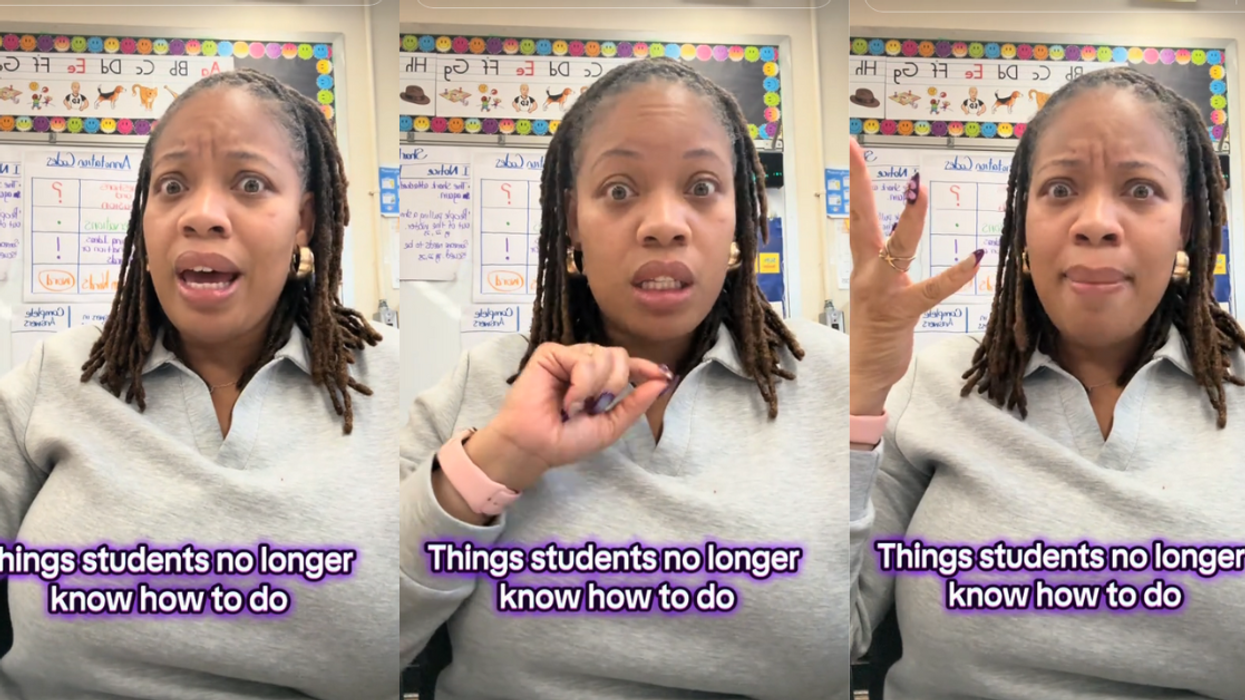According to one report, approximately 3.3 billion people worldwide—43 % of the population—are multilingual, meaning they speak at least two languages. According to the last Census, 21.6% of people in the United States speak more than one language, while in the United Kingdom, the number is 36%.
More multilingual people speak English as a second language than English speakers who have learned another language besides English. Worldwide, people who learned English as a first language rate among the lowest in multilingual rates.
By comparison, 66% of Italians are multilingual while 70% of Chinese people speak more than one language. English is one of the most common languages for non-speakers to learn.
Reddit user oliviamonet asked:
"People who are bilingual in English and another language, what’s a word that exists in your other language that you are surprised doesn’t exist in English?"
Spanish
"In Spanish, sobremesa. It's the period of time you stay seated at the table talking after you're done eating."
~ sapphicor
"In Dutch, natafelen is specifically the talking at the table. Uitbuiken is basically leaning back, letting the food settle."
~ de_G_van_Gelderland
"You don't necessarily need to do uitbuiken at the dining table. Can be done on the couch in front of the TV, too."
~ simpimp
Filipino
"A Filipina lady said, 'I was talking to my...' and stopped and asked me what the English word is for a parent of the person your kid married—the parent of your son-in-law or daughter-in-law."
"It's a relationship that we have no word for."
~ OlyScott
"Never thought about that in English! In spanish we call them consuegros."
~ maccaron
"To nobody's surprise...in Italian we have consuocero and cognato."
~ theknight38
"In Puerto Rico we use suegros and cuñados."
~ 1heart1totaleclipse
"There is a word for that in Slovak! It's svat/svatka (father/mother of your child-in-law)."
~ MikrokosmicUnicorn
Finnish
"Finnish language is famous for 'kalsarikännit'—getting drunk in your underwear—so I wasn't surprised it doesn't exist in English."
"But I was gobsmacked when I found out English has no casual word for 'tuuletus/tuulettaminen'—a gesture for 'yay!!!' or 'wooo!!'."
"They just call it 'goal celebration' or celebrating... Seems wild."
~ republicofrhubarb
German
"So the Germans use übermorgen which means the day after tomorrow. It turns out it does actually exist in English too- overmorrow but we never use it, which is a shame because it's much more efficient: today, tomorrow, overmorrow.
~ HMCetc
Italian
"A beautiful expression we have in Italian is 'arrangiati'. There do exist turns of phrases in English that mean more or less the same thing, e.g. 'do it yourself' or 'you're on your own', but 'arrangiati' is the imperative and reflexive of 'arrangiare' (to organise, arrange, make do, manage)—basically 'sort yourself'."
"However, arrangiati has the same heft and directness, and general sentiment, of basically telling someone to go f*ck themselves. No direct English translation leaves me satisfied as telling someone 'arrangiati!' does."
~ exhausted_wombat
Swedish
"Lek (unstructured play or game) and spel (structured play or game)."
"For example a tug of war with my dog is lek, while Monopoly is spel."
"I do game design and while I can talk in English about structured and unstructured play, I can't do so effortlessly with people knowing exactly what I mean with just one word."
~ elindalstal
Indonesian
"Bahasa Indonesia has kita—'we including you'—and kami—'we, but not you'."
"I wish we had words to distinguish between inclusive and exclusive 'we' in English as well."
~ NyanCatNyans
Hindi
"This has annoyed me for some while, the word जूठा (juṭhā), it has a meaning used for food tained by saliva."
"For example, I won't eat this because it is brother's जूठा food."
~ chim_anu
"For drinks 100% English has backwash, but not a word for food!"
"But the idea definitely exists of not eating something someone else has had their mouth on. Like when my kids friends are over and don't eat the food given to them, ain't no one but the chickens eating that afterward."
~ mataeka
Japanese
"口寂しい (Kuchisabishī) is literally lonely Mouth. It means stress or boredom eating."
"Eating out of habit or chewing on something to have something to do."
~ Gureiify
Italian
"Another Italian one that comes to mind is "abbiocco", which is the drowsiness you get after a big meal. It is a tiredness and brain fog exclusively associated with a full belly. Very useful in Italy."
~ exhausted_wombat
German
"Kummerspeck ... literally grief (or worry) bacon. It means the weight you gain from emotional eating."
~ Frau-Pfau
Swedish
"Gråtrunka, a Swedish word that refers to a man masturbating while crying, I was told this is usually used when a man has just been broken up with."
"First heard that one from some teenage Stockholm boys harassing people at a mall. I don’t think English needs to carry that word over."
~ eldaveed
"C'mon English team, we can figure this out. Sobsturbation? Sadjack? Cryin-and-crankin? The Alone Wanker? OH. TEARJERKER, IT'S TEARJERKING I got it."
~ CanRova
Polish
"In Polish, załatwić. It basically means to 'get something done, but don’t ask me how'."
"And 'kombinować'. You can't really understand Polish culture, unless you grasp the whole meaning of this word."
"It means to find a way around something, find a solution to some problem, but in a slightly mischievous, not always legal, way."
~ Aimil27
Lakȟótiyapi (Lakhóta Indigenous American language)
"Considering my language predates all the European languages listed here ever being spoken in North America and we sedm to be comparing things to American English, in Lakota (Sioux Nation) there are many words and phrases that, while technically have translation to a point, don't embody the cultural or spiritual implications of them in English."
"So Šúŋkawakȟáŋ would roughly translate to 'Spirit Dog' but is a phrase that describes horses in the context of their impact on our people and their spiritual significance. It doesn't just mean 'a horse'. There are also MANY different ways and accompanying words/phrases that can accompany it that would change the implication of the words."
"Another example would be Makȟá. The direct translation would be the earth but also means the soil, nature, the spirit of the earth and the creator spirit."
"Variations of its use would be Makȟáta: to be on the Earth or in nature. Makhíthma: to be in or one with the Earth/nature/the spirit of the creator. Or Uŋčí Makȟá which is used more strictly for ceremonial purposes."
~ Wonderful-Ad440
"I'd go with wašíču, which most people mistranslate to mean "White man" which would be HaSka in the Oglala Lakhótiyapi I learned. Wašíču predates European contact, but definitely got more use after."
"There are English words that describe components of it, but no single English word that captures what it means literally and culturally when someone is a wašíču."
"It's someone who takes all the best things for themselves, puts themselves first before the community."
"Which, as Wonderful-Ad440 would know, is a massive taboo/disgrace in Lakhóta culture."
~ MohawMais
"Love is another one where English has one word, but it gets used for everything to the point it means almost nothing.
"In Lakhótiyapi I learned multiple words that all translate as 'love' in English, but each one has a different us.
"Thečhíhila – I cherish you
"Čhaŋtóčhignake – I hold you in my heart
"Iyótaŋčhila – I love you
"My Até would use thečhíȟila with us, his three daughters, but iyótaŋčhila for our Akenistén:’a (Mum is Kanien'kéhá:ka/Haudenosaunee/Métis, not Lakhóta). Čhaŋtóčhignake is something I'd use for a community or a group. It's not as intimate as thd other two, but still means love."
~ MohawMais
English
"I got a reverse one. I speak French and we don’t have a word for 'cheap'—isn’t that crazy?"
"Such a simple word. We just say not expensive or affordable, but it doesn't havd the same connotation."
~ theyb10
Is there a word in a language you speak that doesn't have an equivalent in English that you wish did?








 Fox News
Fox News John McDonnell/Getty Images
John McDonnell/Getty Images @eltokh/X
@eltokh/X







